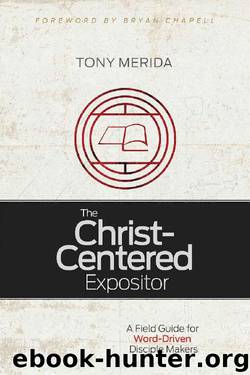The Christ-Centered Expositor: A Field Guide for Word-Driven Disciple Makers by Tony Merida

Author:Tony Merida [Merida, Tony]
Language: eng
Format: epub
Tags: Religion/Christian Ministry/Preaching
Publisher: B&H Publishing Group
Published: 2016-09-30T16:00:00+00:00
9
Step 2: Unify the Redemptive Theme
They read from the book, from the Law of God, clearly, and they gave the sense, so that the people understood the reading.
—Nehemiah 8:8 (ESV)
A sermon should be a bullet, not a buckshot. Ideally, each sermon is the explanation, interpretation, or application of a single dominant idea supported by other ideas, all drawn from one passage or several passages of Scripture.214
—Haddon Robinson
In Andy Stanley and Lane Jones’s Communicating for a Change, the authors emphasize the need to preach a “one point” sermon.215 The book provides some helpful ideas for preparing easy-to-remember sermons. The idea of a one-point sermon is not a new idea, however. At the heart of classical expository preaching theory is the conviction that the sermon is mainly about one big idea or theme.216 The theme includes the primary meaning of the text and the primary application of the text. The key questions are these: What is the text about? And what do I want the hearers to do, believe, or change in light of this text?
While there will be numerous supporting ideas in Word-driven sermons, the essence of the sermon should flow from one dominant thought that emerges from the text clearly and naturally. John Stott argues that identifying the dominant theme is essential for two reasons: every text has a theme, and one of the ways a sermon differs from a lecture is that it attempts to persuade the hearers about one primary message.217 Therefore, after we study the text (step 1), we should then try to identify the main idea of the text and sermon in order to drill this truth into the minds of the hearers.
Two essential stages are involved in unifying the theme of an expository sermon. We first should identify the main point of the text (MPT). The MPT is determined through careful exegesis of the selected passage, described in Step 1: Study the Text. Next, we should develop the main point of the sermon (MPS)—in view of the meaning of the text, the redemptive elements in the text, in light of our particular audience and occasion.
I have included a third non-essential stage for unifying the theme as well: the title. While the title is not an essential element of unifying the theme, it could serve as a way to reinforce the MPT and the MPS.
I will offer some ideas about these three stages in this chapter. It should be noted that I have verse-by-verse preaching through a Bible book in mind primarily. You could also apply these principles, however, to an alternative form of expositional preaching.
Identify the Main Point of the Text
The MPT is a past tense statement about what the text meant in its historical context. This is the first step in moving from exegetical study to the process of developing the actual sermon. After doing the hard work of exegesis, you should be able to summarize the passage in a single sentence. This sentence is the foundation for your exhortation. Therefore, the
Download
This site does not store any files on its server. We only index and link to content provided by other sites. Please contact the content providers to delete copyright contents if any and email us, we'll remove relevant links or contents immediately.
Victory over the Darkness by Neil T. Anderson(2850)
The Rape Of Nanking by Iris Chang(2805)
Chosen by God by R. C. Sproul(2155)
Habits of Grace by David Mathis(1973)
Crash the Chatterbox by Steven Furtick(1970)
Knowing God by J.I. Packer(1844)
How To Be Born Again by Billy Graham(1775)
A Prophet with Honor by William C. Martin(1714)
Gospel-Shaped Marriage by Chad van Dixhoorn(1705)
Peace with God by Billy Graham(1679)
Confronting Christianity by Rebecca McLaughlin(1580)
God's Smuggler by Brother Andrew(1534)
Angel Dreams by Virtue Doreen Virtue Melissa(1469)
Whisper by Mark Batterson(1452)
Missionaries by Norman Lewis(1425)
The School of Biblical Evangelism by Ray Comfort(1424)
The Truth War by John MacArthur(1420)
The Poems of Rowan Williams by Rowan Williams(1350)
Do Greater Things by Robby Dawkins(1320)
